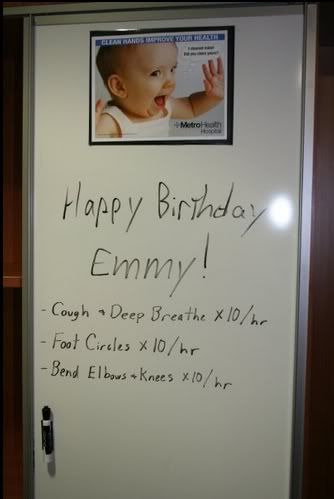Names Aren't Logical
Posted on Thursday, April 14, 2011 by Alex R. Cronk-Young
We're being raised in a time when people are trying their best to make their children's names as unique as possible. No one seems to want to name their kids something boring and common, I get that. But when someone has free reign to ignore all that has come before them, it gets a bit out of hand.
You could technically name your child a random stream of symbols and tell everyone it's pronounced Bob and that's perfectly legal. I think. The point is, no one has to pay attention to any logic in the way a name should be spelled in order to be pronounced the way they want it pronounced. This has led to plenty of people completely ignoring logic and question every name they come across.
Emerson is a name. Quite an old name. We didn't make it up. It might not be very common for a girl until more recently, but it's certainly a name and that is most definitely the way it should be spelled. Mostly, we call our daughter Emmy, but I couldn't even tell you how many times people misspelled that nickname or asked about how to spell it. For awhile my sister kept spelling it "Emi" and I had to hold myself back from telling her that was the stupidest thing I'd ever seen. Emi wouldn't be pronounced as Emmy, it would be pronounced like Eli.
That doesn't really matter though, because if we wanted to say her nickname was spelled Emi, we easily could. With a name, the only thing that matters is how the parent says it's spelled or pronounced, and that is borderline crazy talk. You need to add a second 'm' to Emerson when turning it into Emmy, or else it just wouldn't make any sense. Somehow this rule of grammar proves me right, I just can't get my head around explaining it right now:
Rule #4: “Doubling Final Consonants”
When adding an ending to a word that ends in a consonant, we double that consonant in many situations. First, we have to determine the number of syllables in the word.
Double the final consonant before adding an ending that begins with a vowel when the last syllable of the word is accented and that syllable ends in a single vowel followed by a single consonant.
- submit is accented on the last syllable and the final consonant is preceded by a vowel, so we double the t before adding, for instance, an -ing or -ed: submitting, submitted.
- flap contains only one syllable which means that it is always accented. Again, the last consonant is preceded by a vowel, so we double it before adding, for instance, an -ing or -ed: flapping, flapped. This rule does not apply to verbs that end with "x," "w," "v," and "y," consonants that cannot be doubled (such as "box" [boxing] and "snow" [snowing]).
- open contains two syllables and the last syllable is preceded by a single vowel, but the accent falls on the first syllable, not the last syllable, so we don't double the n before adding an ending: opening, opened.
- refer contains two syllables and the accent falls on the last syllable and a single vowel precedes the final consonant, so we will double the r before adding an ending, as in referring, referral. The same would apply to begin, as in beginner, beginning.
- relent contains two syllables, but the final consonant is preceded by another consonant, not a vowel, so we do not double the t before adding an ending: relented, relenting.
- deal looks like flap (above), but the syllable ends in a consonant preceded not by a single vowel, but by two vowels, so we do not double the final l as in dealer and dealing. The same would apply, then, to despair: despairing, despaired.
Thanks to Alex Martin, Jonathan Cole, and Jay Henningsen for the grammar help on this post.
Subscribe to:
Post Comments (Atom)






No Response to "Names Aren't Logical"
Leave A Reply